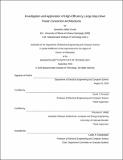Investigation and application of high-efficiency large-step-down power conversion architectures
Author(s)
Gunter, Samantha Joellyn
DownloadFull printable version (16.46Mb)
Other Contributors
Massachusetts Institute of Technology. Department of Electrical Engineering and Computer Science.
Advisor
David J. Perreault and Khurram K. Afridi.
Terms of use
Metadata
Show full item recordAbstract
In this thesis, we introduce two large-step-down dc-dc converter architectures that are designed to provide zero-voltage switching of the power devices. While the techniques used in these converters can be used in a wide range of applications, the operating voltage and power levels used in this thesis are for data centers, where dc distribution power delivery is expected to see its first deployment. The nominal 380 V bus voltage will need to be converted to 12 V using a high-efficiency dc-dc converter that can deliver several hundred watts of power to each rack to power the servers. The converters are expected to operate efficiently across a wide input voltage range of 260 V to 410 V and down to powers in the tens of watts range. The first converter architecture is based on the concept of an Impedance Control Network (ICN) resonant converter. Using phase-shift control along with a specifically designed impedance network, this converter can maintain resistive loading of the inverters as the input voltage varies. To back down in power, the converter can be efficiently operated using burst (on/off) mode control. To deliver lower power, we introduce an additional control technique using Variable Frequency Multiplier (VFX) inverters and/or rectifiers. The second converter architecture combines the properties of an active bridge converter with multiple stacked inverters, a multi-winding single core transformer, and a reconfigurable rectifier. The stacked inverter topology improves the range of powers over which zero-voltage switching can be achieved. The multi-winding transformer and reconfigurable rectifier further extend the efficient operating range to very low powers by reducing core loss and increasing zero-voltage switching capability. Both proposed architectures are suitable for large-step-down, wide-input voltage, wide-output power applications such as dc-dc converters for dc distribution.
Description
Thesis: Ph. D., Massachusetts Institute of Technology, Department of Electrical Engineering and Computer Science, 2016. This electronic version was submitted by the student author. The certified thesis is available in the Institute Archives and Special Collections. Cataloged from student-submitted PDF version of thesis. Includes bibliographical references (pages 355-360).
Date issued
2016Department
Massachusetts Institute of Technology. Department of Electrical Engineering and Computer SciencePublisher
Massachusetts Institute of Technology
Keywords
Electrical Engineering and Computer Science.